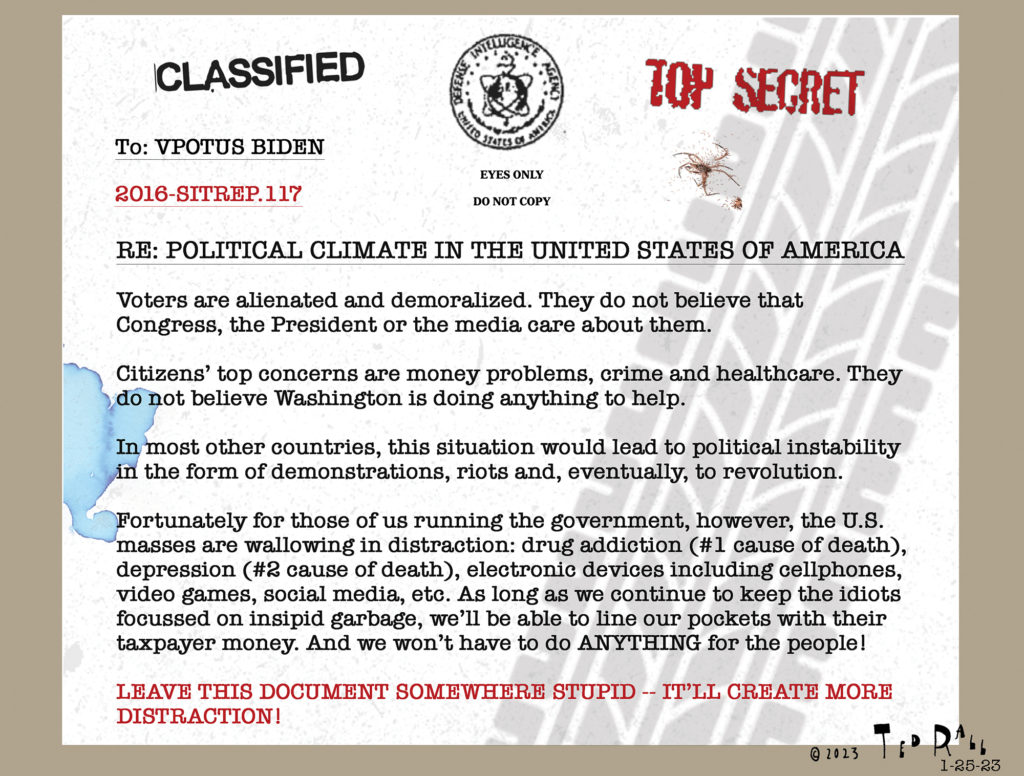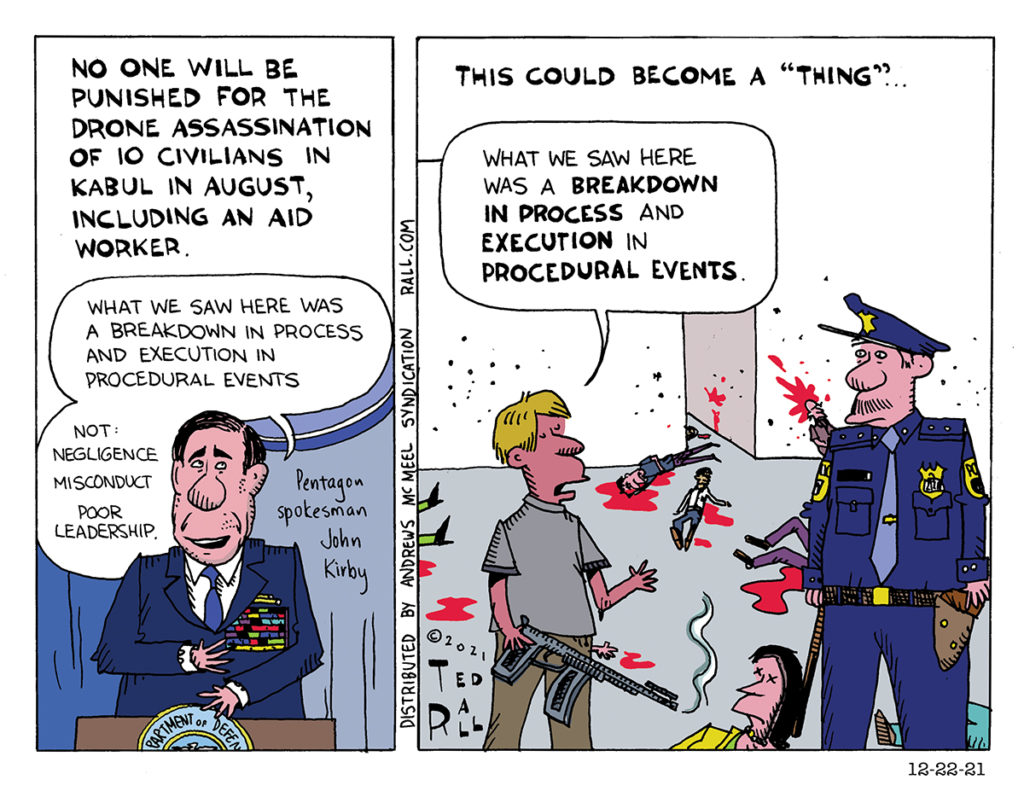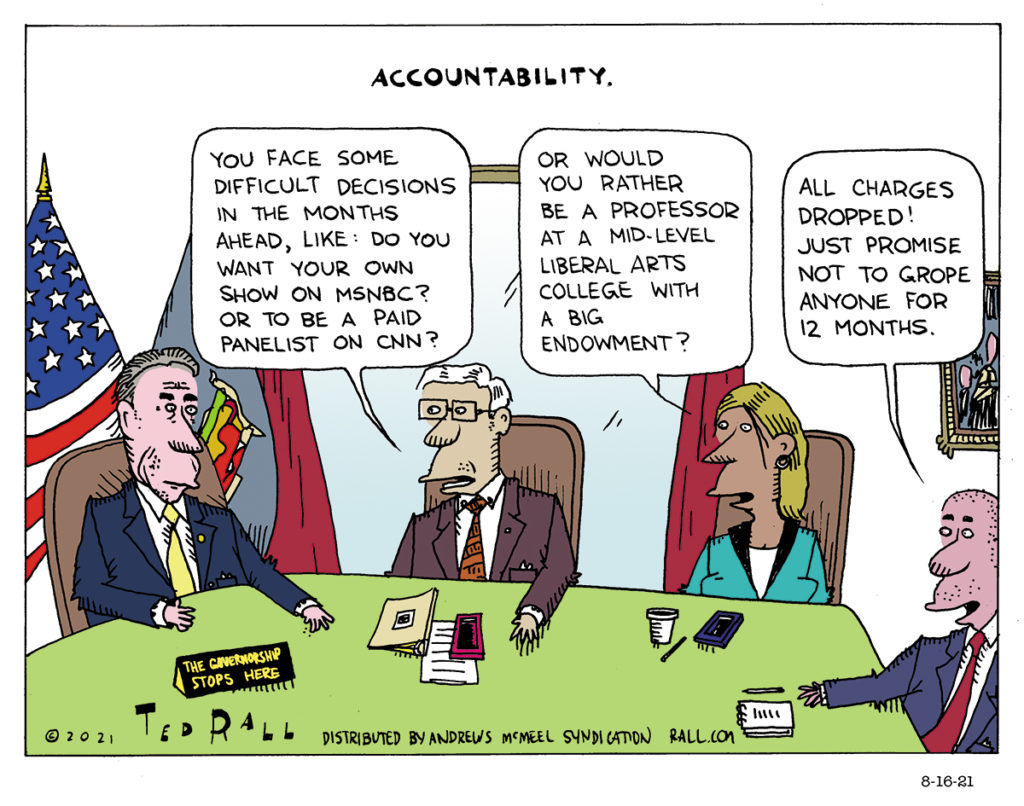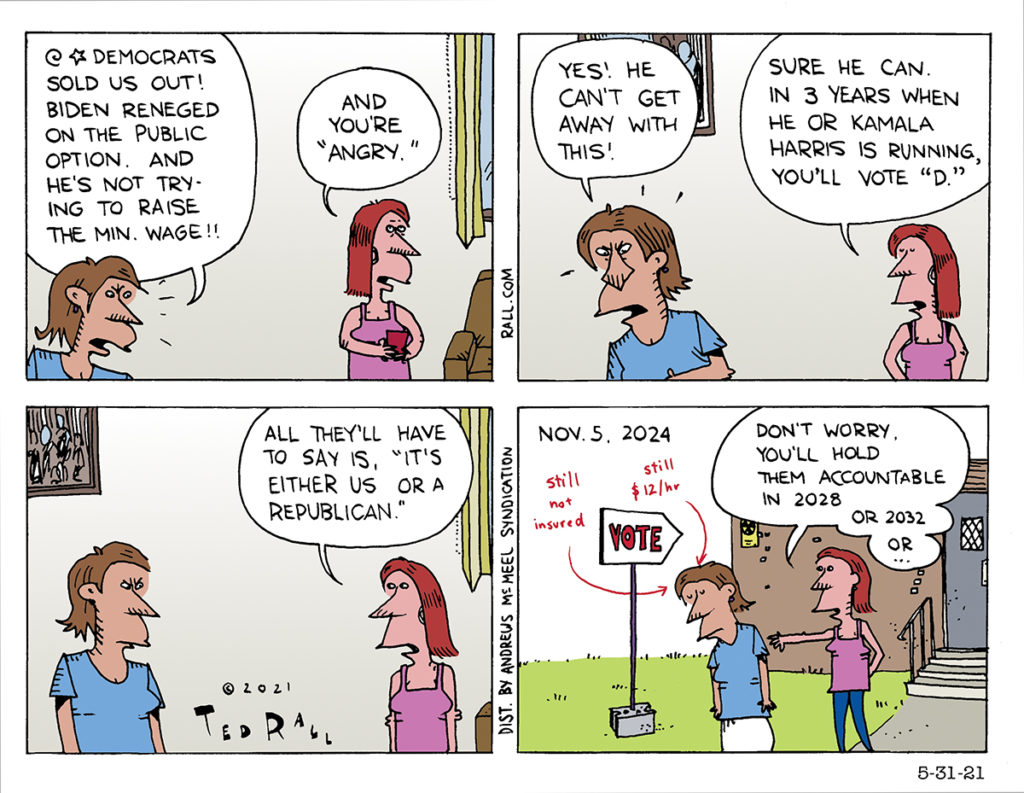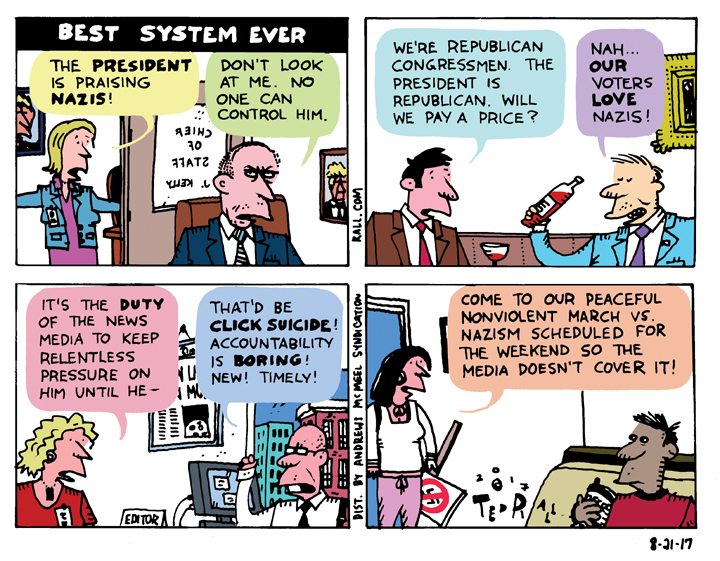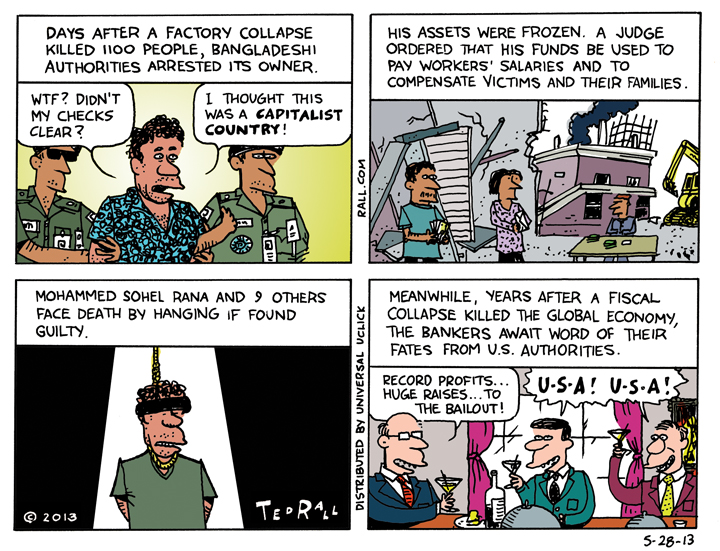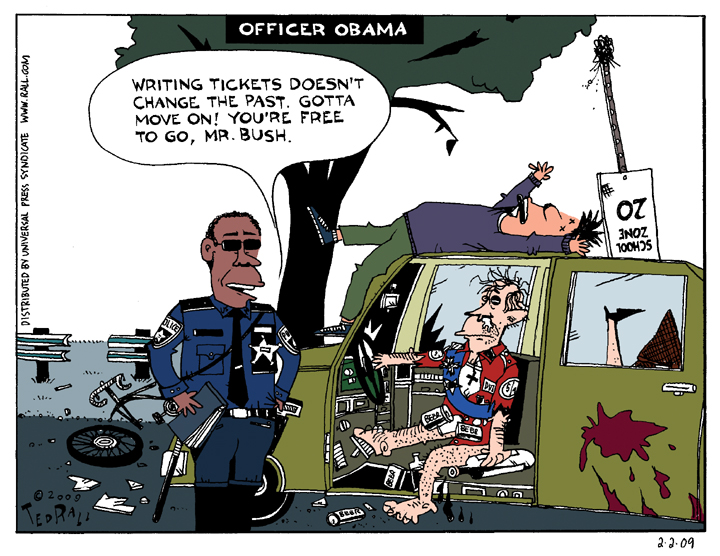Both Presidents Trump and Biden are under fire and under special counsel investigation for taking classified documents with them from the White House. National security was probably never in critical danger. But the distraction factor could be fatal to the national conversations we ought to be having instead.
Hold Them Accountable in 2040
Once again, Democrats are selling out their progressive voters. This time, Joe Biden says he’s not going to bother trying for a public option on the Affordable Care Act and there’s no sign of any attempt to increase the minimum wage. What will progressive voters do about it? If history serves, probably nothing.
Trump Gets Away with Stuff Because He Does
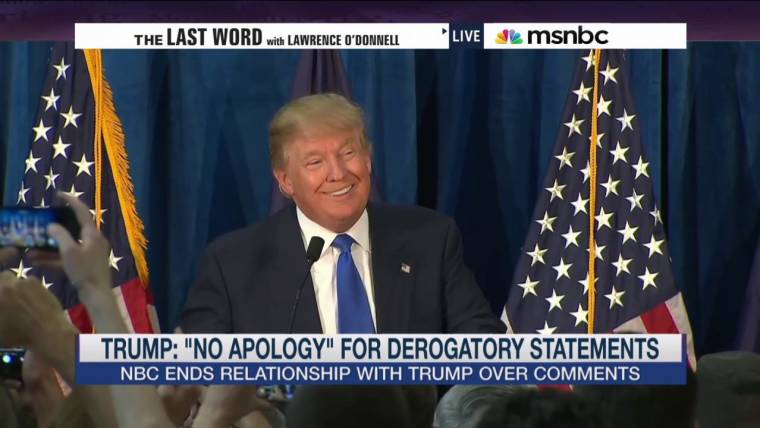
“I could stand in the middle of Fifth Avenue and shoot somebody and I wouldn’t lose voters, okay?” Donald Trump said at an Iowa campaign rally in January of 2016. That remark gets quoted, mostly by liberals bemoaning the unquestioning loyalty of the president’s stupid supporters, a lot.
But there’s another, more interesting, facet of that meme: Trump, it’s clear, can get away with just about anything—impeachment included. He will be impeached without turning a single voter against him.
Nothing has ever been less deniable than the president’s imperviousness to, well, everything. Trump’s haters hate it, his fans love it, everyone accepts it. A month ago Trump’s lawyers for real argued in open court that, if their client actually were to go on a shooting spree in midtown Manhattan, he couldn’t be charged with a crime until he was no longer president.
Without enumerating President Trump’s rhetorical offenses and deviations from cultural and political norms, how does he get away with so much? Why doesn’t he lose his base of his electoral support or any of his senatorial allies?
It’s because of framing and branding. Trump isn’t held accountable because he has never been held accountable. He has never been held accountable because he has never allowed himself to be held accountable.
Hitler believed that, in a confrontation, the combatant with the strongest inner will had an innate advantage over his opponent. Audacity, tenacity and the ability to keep your nerve under pressure were essential character traits, especially for an individual up against stronger adversaries. Trump never read “Mein Kampf” but he follows the Führer’s prescription for success. He never apologizes. He never admits fault or defeat. He lies his failures into fake successes, reframing history into a narrative that he prefers. It’s all attitude: because I am me, I can do no wrong.
I’m not a billionaire real estate grifter turned billionaire presidential con man.
But I get this.
When I began my career as an editorial cartoonist, I staked out ideological territory far to the left of my older, established colleagues, most of whom were ordinary Democrats. In the alternative weeklies, other cartoonists were as far left as me. But they weren’t syndicated. I went after mainstream daily newspapers. My first two syndication clients were the Philadelphia Daily News and the Los Angeles Times.
My status as an ideological outlier reduced the number of newspapers willing to publish my work. But the editors who did take a chance on me knew what they were getting and so were able to defend me against ideological attacks. Once they saw that braver papers were publishing my cartoons, moderate publications picked them up too.
Despite being an unabashed, unrepentant leftist, I became the most reprinted cartoonist in The New York Times. Secretly, many of the “Democratic” cartoonists were as left as me. They were jealous: how had I gotten away with wearing my politics on my sleeve in such bland outlets as The Des Moines Register and The Atlanta Constitution?
First, I was willing to take some heat. I accepted that I would get fewer clients and thus less income. I insisted on drawing the work I wanted to do, never watering down my politics. If everyone rejected me, that was fine. Better not to appear in print than to do wimpy work. And in the long run, I was better off. There have been rough patches. But progressives have taken over the Democratic Party. I’m one of the few pundits the left can trust for a simple reason: unlike Bill Maher and Arianna Huffington, I have always been one of them, regardless of prevailing winds.
Second, I developed an unusual drawing style. When I started out most editorial cartoonists mimicked two icons of the 1960s and 1970s, Pat Oliphant and Jeff MacNelly. The “OliNelly” house style of American political cartooning was busy, reliant on caricature and crosshatching. Daily newspaper staffers drew single-panel cartoons structured around metaphors, labels and hoary symbols like Uncle Sam, the Democratic donkey and Republican elephant.
I did everything the opposite. I drew multiple panels, wrote straightforward scripts inspired by comic strips. My drawing style stripped down to a brutally simple abstract look in which most characters looked almost identical. No metaphors—you didn’t need to learn how to read a Ted Rall cartoon. They weren’t as pretty as MacNelly’s. The chairman of the Pulitzer committee, whose death I shall toast, denied me the prize because I didn’t “draw like a normal editorial cartoonist.” But you knew my stuff wasn’t by anyone else. Branding.
I created space for myself ideologically and stylistically. So I got away with—still get away with—more than many of my peers.
Finally, I learned to never apologize.
Most of the time when a cartoonist apologizes for causing offense, they don’t mean it. Their editors, themselves feeling the heat from an avalanche of letters-to-the-editor and social media opprobrium, force them to say they’re sorry. This I will not do. It’s too undignified.
Sometimes cartoonists really do screw up. In one particular cartoon I took aim at the president and instead wound up wounding a group of disadvantaged people. So I acted like a human being: I apologized.
What a mistake! Papers that had stuck with me through previous controversies abandoned me, canceling my work. The group I’d apologized to proclaimed itself satisfied and appealed to the quislings to reconsider, in vain. I learned my lesson. Never apologize, especially when you’re wrong. Americans forgive evil, never weakness.
With his far longer reach, influence and experience than yours truly, Donald Trump has figured out how to carve out room for himself to run off at the mouth, offend protected groups and defy cherished traditions. No one can make him stop. No one but him. And no one can make him say he’s sorry.
(Ted Rall (Twitter: @tedrall), the political cartoonist, columnist and graphic novelist, is the author of “Francis: The People’s Pope.” You can support Ted’s hard-hitting political cartoons and columns and see his work first by sponsoring his work on Patreon.)
Best System Ever
After President Trump defended white nationalists who rioted in Charlottesville, Americans marveled at the lack of accountability. The White House staff was unable to muzzle an out-of-control president. Republican legislators refused to distance themselves, much less criticize him. The media seemed to be spinning uselessly, and showed no signs of a willingness to follow up. As for us, what are we supposed to do, attend another useless rally?
SYNDICATED COLUMN: Working for the U.S. Government Means Never Having to Say You’re Sorry

Harry Truman famously kept a sign on his desk that read: “The buck stops here.” (“Buck” is a disused term for “accountability,” not money.) What Truman’s phrase meant — it says a lot about the state of things that it needs to be explained — was that he, like the captain of a ship, accepted responsibility for everything that happened under his watch.
With Barack Obama, there’s nary a buck to be found. To paraphrase the 1970 movie “Love Story,” working for the United States government means never having to say you’re sorry.
Days before Obama took office in 2009, Obama signaled that federal workers who break the law would have nothing to worry about. During his campaign he’d promised to prosecute the CIA and military personnel who tortured Afghans, Iraqis and other Muslims under orders from Bush and Cheney. People who voted for him expected him to follow through. The CIA torturers were worried sick. Their victims looked forward to seeing justice served.
Breaking his pledge, Obama issued the monsters a “get out of jail free” card. There wouldn’t even be an investigation, much less indictments. “We need to look forward as opposed to looking backwards,” he said. The new president traveled to Langley to reassure the torturers everything would be cool. (“I will be as vigorous in protecting you as you are vigorous in protecting the American people.”) He even cooperated with the Republicans who approved of torture to pressure other countries not to file charges against U.S. torturers.
After 9/11, Americans asked themselves: why do they (Muslims in general, foreigners in particular) hate us?
No need to ask that one anymore.
One telltale sign that the government is engaged in a cover-up is timing: when it releases a report just before the weekend news blackout, you know something nasty is afoot. Obama’s latest whitewash, dumped online Friday, is the Administration’s attempt to drown its responsibility for one of the most heinous acts of mass murder in years in 3000 pages of spin, dissembling and circular logic.
On October 3rd, an AC-130 fixed-wing gunship — a fearsome array of high-caliber weaponry best described as a hovering battleship — unleashed an hour of hellfire on a Doctors Without Borders hospital in Kunduz, northern Afghanistan, killing 42 doctors, staffers and patients, and wounding many others. The facility was completely destroyed. MSF (the French acronym for the group) pulled out. There is no longer any high-quality trauma care available in a major city in an active conflict zone.
It is now universally acknowledged that the attack was a mistake.
At the time, however, the Pentagon lied and denied. “Collateral damage,” they first said — they were aiming at something else. For an hour. Over and over. Then they said the Taliban were firing at U.S. forces from inside the hospital. (Never happened.) Next they blamed Afghan forces for calling in the airstrike. (They couldn’t have, and didn’t.) Finally, they admitted it was U.S. Special Forces.
Ultimately the new commander of NATO and U.S. forces in Afghanistan issued an actual apology on March 22nd. “They hit us six months ago and are apologizing now?” spat Zabiullah Niazi, an OR nurse who lost his eye, one finger and the ability to use his hand, in the attack — and, like the other victims, has yet to receive compensation.
The heavily-redacted 3000-page report issued Friday by the Pentagon “describes a mission that went wrong from start to finish,” according to The New York Times. What stands out is the Americans’ obsession with protecting themselves at all cost, all others be damned — an attitude that has characterized the post-9/11 War of Terror.
“Even after Doctors Without Borders informed American commanders that a gunship was attacking a hospital, the airstrike was not immediately called off because, it appears, the Americans could not confirm themselves that the hospital was actually free of Taliban,” reports the Times. “‘Immediately calling for a cease-fire for a situation we have no SA’ — situational awareness, that is — ‘could put the ground force at risk,’ an American commander [said].” If you’re trying not to hurt innocent people, prudence dictates that you hold fire until your target is positively identified. Here, as usual in U.S. war zones, the default mode was to keep firing no matter what.
This is reckless disregard for human life writ large. So who will be held accountable?
“The punishments for the attack will be ‘administrative actions’ only, and none of those being disciplined will face criminal charges because the attack was determined to be unintentional… The punishments include suspension, removal from command and letters of reprimand, which can seriously damage or end a career.”
Reckless disregard for human life is a war crime. For example, former Rwandan official Clément Kayishema was convicted by an international tribunal for several counts of war crimes related to murder of Hutus in 1994, one of which was his reckless disregard for the possibility that his actions would lead to people’s deaths.
Forty-two people were murdered in Kunduz. So what if it’s just manslaughter or second-degree murder, rather than premeditated first-degree murder? Justice demands prison sentences, not letters added to personnel files.
I’d start with the guy who sits behind Harry Truman’s old desk.
(Ted Rall is the author of “Bernie,” a biography written with the cooperation of Democratic presidential candidate Bernie Sanders. “Bernie” is now on sale online and at all good bookstores.)
Ellen Pao vs Kleiner: What It Means to You and Silicon Valley
Originally published by ANewDomain:
Ellen Pao’s gender discrimination lawsuit has the tech world talking about what it will mean if she wins a verdict against her former employer, a Silicon Valley venture capital firm.
It’s a crazy case. Among the highlights: an office affair gone wrong, with the jilted married guy accused of retaliating against the jilting single woman; a company ski trip for bros before hoes; juicy revelations about huge salaries and ridiculous work hours, including putting in time during a honeymoon.
So what does it mean?
Maybe it’s about the power of money.
 “What’s Really at Stake in Ellen Pao’s Kleiner Perkins Lawsuit,” asserts Emily Bazelon in The New York Times, is the tantalizing possibility of “a cultural shift” in Big Tech, infamous for its young white male-dominated “bro” culture. (They used to call that “frat boy”crap.)
“What’s Really at Stake in Ellen Pao’s Kleiner Perkins Lawsuit,” asserts Emily Bazelon in The New York Times, is the tantalizing possibility of “a cultural shift” in Big Tech, infamous for its young white male-dominated “bro” culture. (They used to call that “frat boy”crap.)
“As the kingmakers who decide which start-ups survive, they have the leverage to make the industry more receptive to women and their ideas or continue to reinforce the ‘brogrammer’ norm,” she writes. (Disclosure: Bazelon edited some of my work in the 1990s.)
Or maybe this lawsuit is about the tightrope women have to walk in the American workplace.
“The real drama is in the more mundane charges, about slights familiar to any woman in any workplace that are rarely aired in public, much less in a courtroom,” Claire Cain Miller writes, also in the Times. “Ellen Pao, a former junior partner, was told that she didn’t speak up enough and was too passive — but also that she spoke up too much and was pushy and entitled.”
Could Pao v. Kleiner Perkins Caufield & Byers be about the paucity of women?
“What is really under examination in this trial is the question of why there are so few women in leadership positions in Silicon Valley. At stake is any hope that the tech world can claim to be a progressive place, or even a fair one.” That’s David Streitfeld. Also in the Times.
Three different takes in the same paper!
Here, let me help make things more confusing — with yet another interpretation of why it matters.
Ellen Pao’s case is really about accountability.
The Silicon Valley that emerged after the dot com crash of 2000 has been a cultural and legal Wild West, dominated by companies run by executives who don’t think the rules apply to them.
Every human resources hack knows that gender discrimination is strictly prohibited under federal law. That’s been true for decades.
Google, the biggest tech employer, has a 70 percent male-30 percent female workforce. (It’s 79 percent – 21 percent for “leadership” positions.) Men in the Valley earn 61 percent more than women with the same job and qualifications. It’s actually getting worse.
Numbers like that lead to one obvious conclusion: the bros aren’t even trying. Because they’re not worried about the EEOC, or PR, or anything at all.
The rules-are-for-peasants mentality was epitomized by late Apple chief Steve Jobs, who famously parked in handicapped spaces. “He seemed to think the blue wheelchair symbol meant the spot was reserved for the chairman,” Andy Hertzfled wrote.
As I reported late last year, tech companies violate federal laws against age discrimination even more brazenly than those concerning gender — which is saying something. Many tech ads overtly state that anyone not “young” need not bother to apply. Electronic Arts had no employees over age 35.
And they’re just as bad on race. Whites and Asians are radically overrepresented; Latinos and blacks, if and when you can find them in Silicon Valley, are paid less than whites for the same job.
It’s not just legal stuff. Silicon Valley firms ignore the golden rule of business that the customer is always right. For the Valley, the customer — you and me — are sources of data and money to be exploited and drained dry without so much as a thank you.
Got a problem with Facebook? Too bad.
They don’t have a single customer service rep you can telephone for help when, say, your creepy ex-boyfriend posts photos of your intimate moments.
Facebook also resets the default on your “privacy” settings to “public” without asking. Nice respect for the fundamental American right to privacy.
Sorry, Mark Zuckerberg — I could have just as easily picked on any other company. Nothing personal.
Back to Ellen Pao.
If she wins, which is by no means certain, it will not mean that Silicon Valley will begin treating its customers with respect, or hire people over age 35. What it will mean is that they have to follow the same rules as the rest of us — or pay the price.

